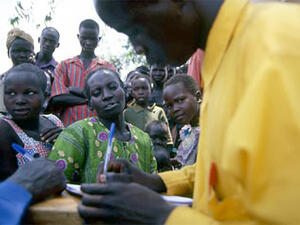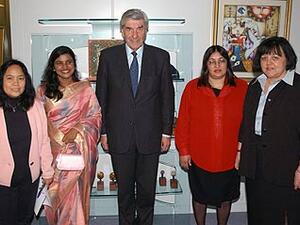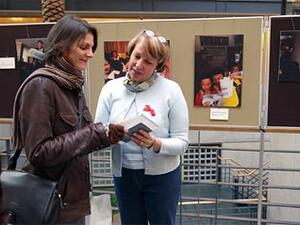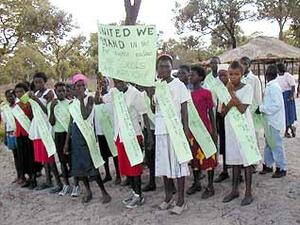Lubbers accepts corruption report, says measures in place to prevent further abuses
Lubbers accepts corruption report, says measures in place to prevent further abuses

Dadaab camp in Kenya, cited in the report by the U.N. Office of Internal Oversight Services.
GENEVA, Jan. 25 (UNHCR) - High Commissioner Ruud Lubbers Friday accepted the highly critical findings of an independent investigation into the agency's refugee resettlement process in its Nairobi office, and said measures had already been taken to safeguard against future abuses.
Lubbers issued a statement in response to a 22-page report released simultaneously in Geneva and New York by the U.N. Office of Internal Oversight Services (OIOS) which describes how a "criminal enterprise" infiltrated the refugee status determination and resettlement process in Nairobi in the late 1990s, forcing payment from refugees seeking permanent resettlement in third countries.
The investigation, carried out at the request of the refugee agency, found that up to 70 people, including three UNHCR local employees, were involved in a complex scheme to extort money from the refugees for various services at the Nairobi office. Resettlement could cost between $3,000 and $5,000. UNHCR itself does not charge fees for resettlement programmes.
Nine people, including the three UNHCR employees, were charged with conspiracy and other crimes and could face more than 10 years in jail. The refugee agency employees have been suspended without pay, and the agency said it reserved the right to take further action against them pending the results of the trial.
The High Commissioner said he and UNHCR's worldwide staff "are both ashamed and outraged by the despicable actions described in this report." He said there was "no excuse, no defence, for such contemptible behaviour," adding that those who "prey on poor and desperate refugees must be punished to the full extent of the law."
Lubbers, who became High Commissioner in January 2001, said the report confirmed suspicions by the agency when it first sought the independent investigation in late 2000. "We in UNHCR must accept institutional responsibility for allowing an environment in which these activities could take place," he added.
That environment eventually included direct threats to UNHCR staff who tried to help with the investigation. During the probe, five UNHCR staff members - including the then-country representative - had to be evacuated after receiving such threats.
Criminal infiltration
"It shows that in an era of mass migration, global organised crime, human trafficking and smuggling, we are not immune to criminal infiltration," the High Commissioner said. "But I am particularly disturbed by the apparent management lapses at various levels of UNHCR which allowed an environment in which corruption could take root in Nairobi."
Even as the investigation was continuing, he said, the agency had already focused its attention on "rectifying several internal structural and management concerns" that may have contributed to making the scandal possible.
The agency said it changed its entire staff in Nairobi dealing with protection and resettlement issues as early as January 2001, and that it deployed additional international staff to the office the same month. Other remedial measures taken included the creation of a so-called transparency committee composed of UNHCR protection staff, officers of embassies representing the resettlement countries, non-governmental organisations and representatives of civil society.
The agency is carrying out frequent security spot checks of operations in Nairobi and instituting a new, tamper-proof file system for resettlement cases. It is also strengthening staff training in fraud awareness and prevention, and separating eligibility interviews on resettlement from the decision-making process on the cases.
Neither the investigators nor Deputy High Commissioner Mary Ann Wyrsch could say how many people were wrongly resettled. More than 26,000 refugees from Kenya were resettled with the help of UNHCR between 1999 and August 2001.





